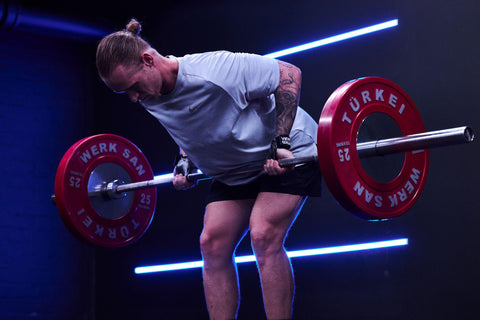January 14, 2024 3 min read

It’s well established that strength training helps you build strong muscles, and this type of exercise is even more important the older you get.
Strength training helps you maintain muscle mass and preserves your ability to do everyday activities—like hauling in a heavy load of groceries or unscrewing those notoriously hard-to-open food jars.
And contrary to popular belief, lifting weights won’t bulk you up (a common concern for women). It’s all about execution.
While a lot has been written about the physical benefits of strength training, the mental health benefits are often overlooked. Ahead we’ll explore five mental health benefits of strength training and how it can be a game-changer when it comes to improving mental well-being.
Strength training, also known as weight training or resistance training, simply means working your muscles against external weights or resistance.
You can do strength training with weight machines, resistance bands, or free weights like dumbbells, barbells, and kettlebells. Exercises where you use your own body weight—like pushups, pullups, planks, and squats—also count as strength training.
Strength training naturally forces you to focus on your mind-body connection, especially when you’re lifting heavier weights. With each strength training workout, you become more attuned to your body.
Pushing yourself past a plateau can lead to bigger gains, but it’s important not to ignore your body’s cues. Adopting a “no pain, no gain” attitude or blindly following a trainer’s directives can land you in the medical clinic.
Whether you lift free weights or use weight machines, a pair of quality weightlifting grips can boost your mind-muscle connection by helping you focus on your target muscles rather than worrying about your grip.
Setting fitness goals, tracking your progress, and sticking to a workout routine can boost your motivation and discipline. This can have spillover effects.
When you see yourself achieving physical strength gains, you’re more likely to apply the same principles to other aspects of your life, whether it’s work, relationships, or personal growth.
We’ve long known that cardio training like running and cycling helps boost mood, thanks to the release of endorphins. Groundbreaking research published in the journal JAMA Psychiatry has also uncovered a positive link between weight lifting and depression—specifically, that resistance training works just as well as aerobic exercise to reduce depressive symptoms.
The research found that both heavy and light resistance training anywhere between two and five days per week helped men and women of all ages stave off depression or lessen its symptoms. The best part? The feel-good impacts of weight training were immediate, according to the research.
Studies have shown that regular strength training can enhance cognitive function, memory, and overall brain health. Resistance training can even help reduce the risk of cognitive decline. The release of brain-derived neurotrophic factor (BDNF) during strength training promotes the growth of new neurons and enhances neural connections, which is crucial for mental well-being.
Additionally, regular strength training sessions can reduce levels of stress hormones in your body, leading to a calmer and more relaxed state of mind. Over time, this can significantly lower your overall stress and anxiety levels.
Strength training can improve body image by putting the focus on getting strong and capable rather than getting “skinny.” As you build muscle, you may notice that your clothes fit better, but you may not see big losses on the scale. That’s because muscle weighs more than fat.
What really matters is how you feel, not the number on the scale. Strength training can be a powerful tool for shifting your mindset about body image and embracing self-acceptance.

The mental benefits of lifting weights are clear. Incorporating strength training into your fitness routine can boost your mental health and brain function.
Whether you’re new to strength training or an experienced weightlifter, Versa Gripps can improve your performance. These innovative grips are like gloves, hooks, and straps all in one. Versa Gripps boost your mind-muscle connection by putting the focus on your form—not your grip.
Designed with safety in mind, Versa Gripps feature a proprietary, custom-engineered non-slip material to help you get a better grip. And with built-in arch support and a quick-release safety feature, they help you lift safely while reducing your risk of injury.
Versa Gripps are available in a variety of sizes and styles. Find your perfect pair of Versa Gripps and start training better.
Copyright Versa Gripps 2025